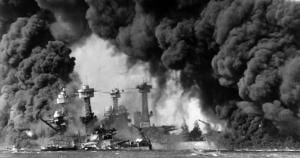 Sometimes bad news seems to sneak up on you.
Sometimes bad news seems to sneak up on you.
On December 7th, 1941, a day that has lived in infamy and one really bad recent movie, the Empire of Japan attacked Pearl Harbor. For regular folks, this seemed sudden, but Washington should have been better prepared.
In business, a giant like Kodak sneers at the competition (“Fuji? Snort!”), until one day bankruptcy comes to the Great Yellow Mother. The problem built up slowly, through years of “best practices” management, and then the end came: Pearl Harbor.
In politics, a party takes majority status for granted while the demographics of the state change and “suddenly” the party can no longer win an election: a Pearl Harbor vote.
In academia, administrators let a program atrophy, fall behind, and then suddenly it is gone: a Pearl Harbor day. Eventually, an entire college can enter the death spiral of program cuts and managed gradual decline until there is a tipping point.
Pearl Harbors are not sudden, though where and how the doom comes may be a surprise. The US government knew that the Japanese Empire did not first declare war and then strike. They had the lessons of the Russo-Japanese War, where the previous Roosevelt earned a Peace Prize, and the horrors of China.
Pearl Harbors happen in business, politics, academia, and education when creativity fails. Warnings are ignored or brushed aside as “apocalyptic.” By the time it is December 7th, the surprise should have surprised nobody.
So when Pearl Harbor happens what to do?
First, change the narrative. The United States immediately struck at the Empire’s homeland with the Doolittle raid. This small strike did little militarily, but it changed the narrative from endless defeat and decline to victory. The United States did not face an invincible foe.
In the same way, small victories count more after tough defeats. Get some wins for the business. Show that you are not going to hire consultants and try strategies that were edgy a decade ago. Take some risks.
Second, act, do not react.
The California Republican Party was once mighty, now whiny. They react to every mistake of the majority party as if this, at long last, will cause people to wake up. They do not realize the living always make mistakes, folks expect them, while nobody is going to trust power to a zombie party looking for 1980’s brains.
Constantine the Great understood how to win in an impossible situation: he changed the rules.
Third, make allies. Spend no time on blame until victory.
Franklin Roosevelt allowed Pearl, but he led us to victory in World War II. The goal of December 8th should not be to assign blame, but to save what can be saved. The historians could decide how we allowed Pearl Harbor to happen, but Roosevelt had a war to win and win he did.
A business, non-profit, or nation can take the loss and regroup. How can this blow be turned to good account? Note that the losses on Pearl Harbor allowed new thinking about air power and greater reasonable risk taking. A company like Kodak starts with a genius like George Eastman, risk taking entrepreneur, and ends with the credentialed manager earnestly seeking to placate stock holders. The United States realized, for the first time, that we needed new thinking or we could lose. At least, unlike Kodak, the Russian Empire, and too many failed liberal arts colleges, the United States did not wait until it was too late.
On a December 8th kind of day, be liberated and assume that the answer is do the metaphorical equivalent of raiding Tokyo.












